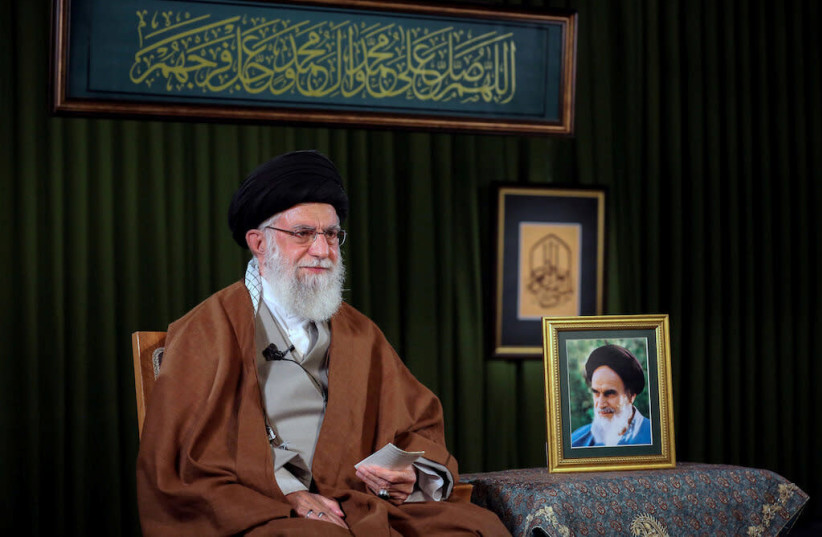
In Western culture, a #woman must expose herself to men in order to be a source of pleasure for them! Is there a graver form of oppression?! They call this ‘#freedom,’ and the opposite they call ‘captivity’! While on the contrary, women’s modest dress brings them respect.— Khamenei.ir (@khamenei_ir) May 15, 2020
On the contrary to the Supreme Leader's beliefs, female Iranian chess grandmaster Mitra Hejazipour has openly claimed that the hijab serves as a "limitation" for women, not "protection," demonishing the country's compulsory hijab dress codes, according to her Instagram.Hejazipour added that the hijab serves as lucid representation of a set of beliefs that designate women as "the second sex.""It creates many limitations for women and deprives them of their basic rights. Is this protection? I say definitely not, it is solely and merely a limitation," she wrote.Since Iran’s Islamic Revolution 40 years ago, women have been forced to cover their hair for the sake of modesty. Violators are publicly admonished, fined or arrested. There are also instructions for women clerks in many Tehran shopping centers to wear "the Maghna'eh" instead of a simple hijab, or face the possible consequence of having their business shut down.The manner in which the Iranian regime cracks down on what they call "compulsory hijab" is quite noteworthy in its own, mainly for the draconian-like arrests they delve out and the prison sentences that tend to accompany them.In 2019, three women - Monireh Arabshahi, Yasamin Aryani, and Mojgan Keshavarz - were arrested for "disrespecting compulsory hijab" and sentenced by the Iranian Revolutionary Court to prison terms of at least 16 years each for disobeying the country's Islamic dress code.The women were each given five years on charges of "assembly and collusion to act against national security," one year for circulating "propaganda against the regime" and ten years for "encouraging and preparing the grounds for corruption and prostitution." In addition, Keshavarz received another seven-and-a-half years for "insulting the sanctities" - a total of 55 years and six months.The global human rights organization Amnesty International at the time condemned the arbitrary detainment of the three women and their denied access to legal counsel in an open letter to Head of the Judiciary Ebrahim Raisi.The charges against the women stem from a video that was widely shared on social media in March, which was taken on International Women's Day. The video shows Arabshahi, Aryani and Keshavarz without their headscarves, disseminating flowers to women on the metro in Tehran while discussing their views on the future of women's rights in Iran.In the video, Aryani hands a flower to a woman wearing a hijab and says: "one day I hope we can walk side by side in the street, me without the hijab and you with the hijab.""Their prosecution is part of a wider crackdown on women’s rights defenders campaigning against forced veiling laws," said Amnesty International.Male and female protesters have been taking part in the “White Wednesday” protests, inviting both sexes to wear hijabs, veils and bracelets in solidarity with those who feel the law is discriminatory and unethical. “White Wednesday” is also for women who choose to wear their hijabs and veils, but reject the notion that all women should be forced to conform to wearing them in public. Dozens of women activists as well as a few men have been arrested in relation to this "crackdown." Additionally, in 2019, fourteen Iranian women's rights activists penned an open letter to Khamenei requesting that he resign from his position after his 20-year tenure. They wrote that the country needs to undergo political change.According to a report by Radio Farda, the letter, dated August 5, 2019 refers to "gender apartheid" and a "patriarchal approach" that for 40 years has stifled the Iranian political climate. They said that since the Iranian Revolution of 1979, the situation in Iran has created an unfair disadvantage for women who want to live and thrive in the country."We, 14 civil rights and women's rights activists, are determined to continue our combat until victory through civil and non-violent measures," they wrote. "Like other pioneers [of non-violent freedom fighters], we go ahead by chanting 'no to the Islamic Republic.'"Four decades of this theocracy has eliminated the rights of half of the country's," they continued.The activists are requesting that others join them in peaceful and non-violent protests to construct a new constitution to eradicate "this anti-women system.""In a world that women in most countries move side by side with men in science, economy, culture, arts, and politics, under the Islamic Republic women still fight for their basic human rights," the women wrote.The letter also claimed that "systemic tyranny and irresponsibility" are the main reasons why the country is in the state it is today, with domestic protests and international politics chaotically spinning out of control before the country's very own eyes.
"captivity" - Google News
May 17, 2020 at 03:17PM
https://ift.tt/2Tc8lTO
Iran's Khamenei: Women in Western cultures are living in 'captivity' - The Jerusalem Post
"captivity" - Google News
https://ift.tt/3b01anN
https://ift.tt/3dbExxU
Bagikan Berita Ini














0 Response to "Iran's Khamenei: Women in Western cultures are living in 'captivity' - The Jerusalem Post"
Post a Comment